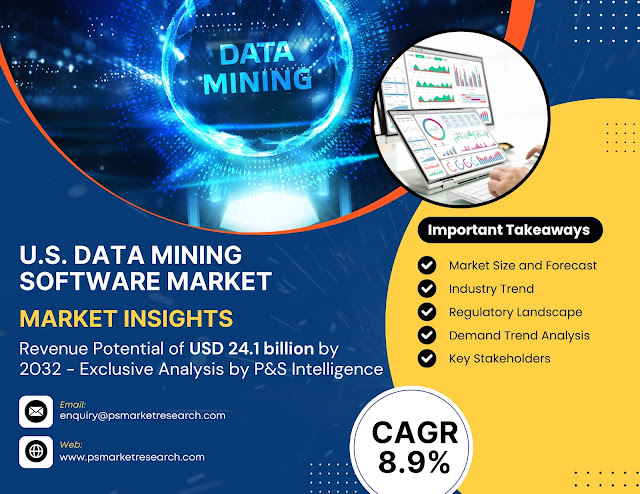According to the latest market research study published by P&S Intelligence, the U.S. data mining software market reached USD 12.3 billion in 2024, and it is forecasted to expand at a compound annual growth rate (CAGR) of 8.9% from 2025 to 2032, climbing to an estimated USD 24.1 billion by 2032.
Download free Report Sample Now
This robust growth is fueled by organizations increasingly
leveraging advanced analytics to uncover predictive insights from both
structured and unstructured datasets. As the volume of digital information
continues to surge across industries, businesses are turning to data mining
tools to gain a competitive edge through pattern recognition and actionable
intelligence.
Several key forces are steering the market’s evolution.
First, the integration of machine learning and AI capabilities is enhancing
traditional data mining platforms, enabling more sophisticated predictive
modeling. Second, sector-wide digitization—particularly in finance, healthcare,
and retail—is driving demand for scalable analytics solutions. Lastly, evolving
regulatory frameworks around data privacy and security are pushing
organizations to adopt compliant, transparent mining tools that ensure governance
while extracting value from data.
Key Insights
- The
market segmentation highlights a strong demand across application areas
such as customer analytics, fraud detection, risk management, and process
optimization; each vertical increasingly deploys tailored data mining
solutions to address specific business needs.
- By
end-user sectors, fintech and healthcare emerged as high-growth segments,
with financial institutions using predictive analytics for credit scoring
and fraud prevention, while healthcare providers apply mining techniques
to improve patient outcomes and operational efficiency.
- Regionally,
the U.S. continues to lead, driven by high technology adoption in key
states and strong presence of major software vendors; however, growth is
also accelerating in mid-tier states as enterprises modernize legacy
systems.
- Technological
innovation remains a critical enabler: the infusion of AI and machine
learning features into data mining platforms is enhancing pattern
recognition, real-time predictive analytics, and automation, significantly
boosting tool efficiency and accuracy.
- Cloud-based
and hybrid deployment models are gaining steam; businesses increasingly
prefer these flexible architectures to support large-scale data ingestion,
scalability, and collaboration across distributed teams.
- Competitive
dynamics are intensifying: established analytics vendors are expanding
their offerings through strategic acquisitions and feature enhancements,
while emerging players focus on vertical-specific mining solutions,
creating new opportunities for niche market penetration.
- Integration
capabilities are becoming a differentiator—data mining platforms that
seamlessly connect with BI tools, data warehouses, and data catalogs are
better positioned to deliver contextual insights across enterprise
environments.
- With
increasing regulatory demands—such as data privacy laws and
industry-specific compliance standards—software solutions offering
built-in governance, audit trails, and transparent analytics are gaining
preference among risk-conscious enterprises.
- As enterprises seek to democratize data insights, user-friendly interfaces, automated workflows, and self-service analytics features are helping non-technical stakeholders harness data mining tools, expanding adoption beyond data science teams.
- Forecasts indicate that the U.S. market could nearly double by 2032, reaching USD 24.1 billion, underscoring both the maturation of analytics use cases and the acceleration of predictive intelligence adoption across industries.








